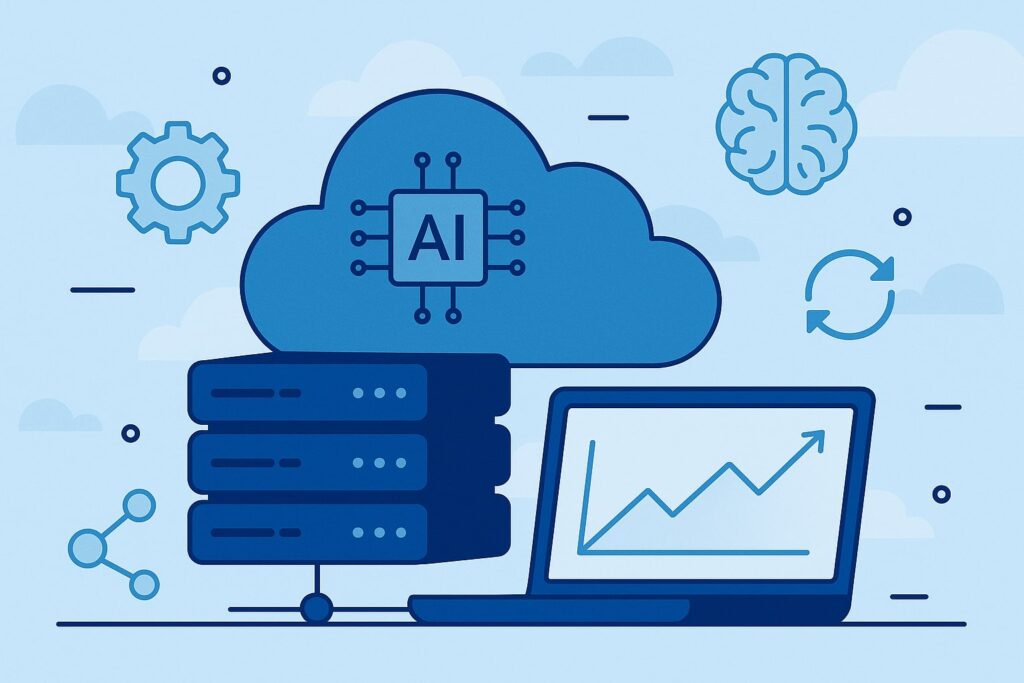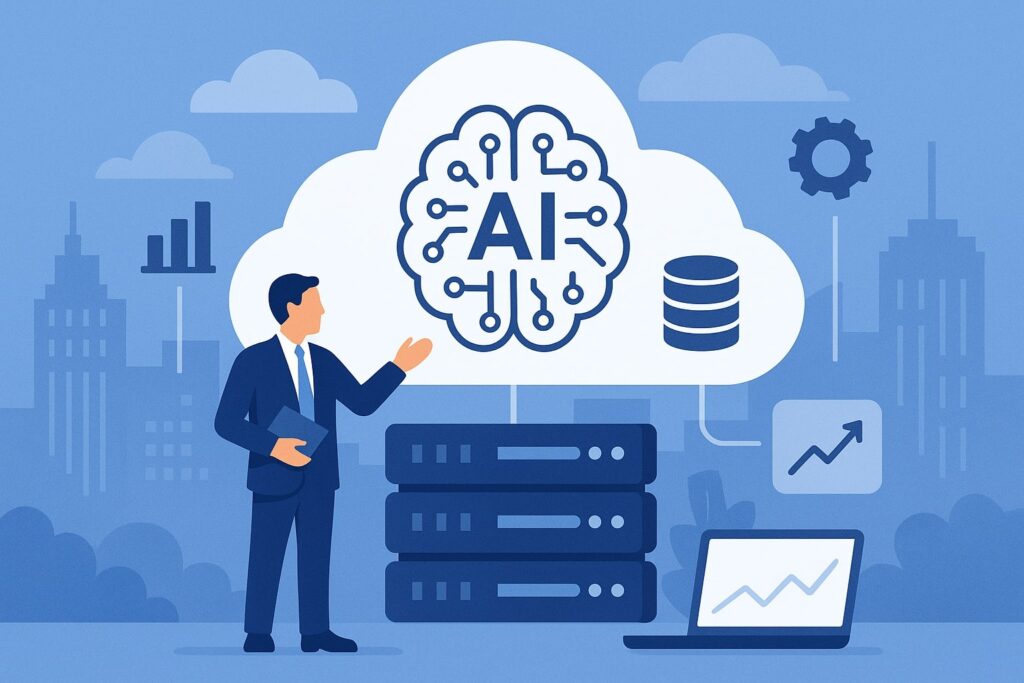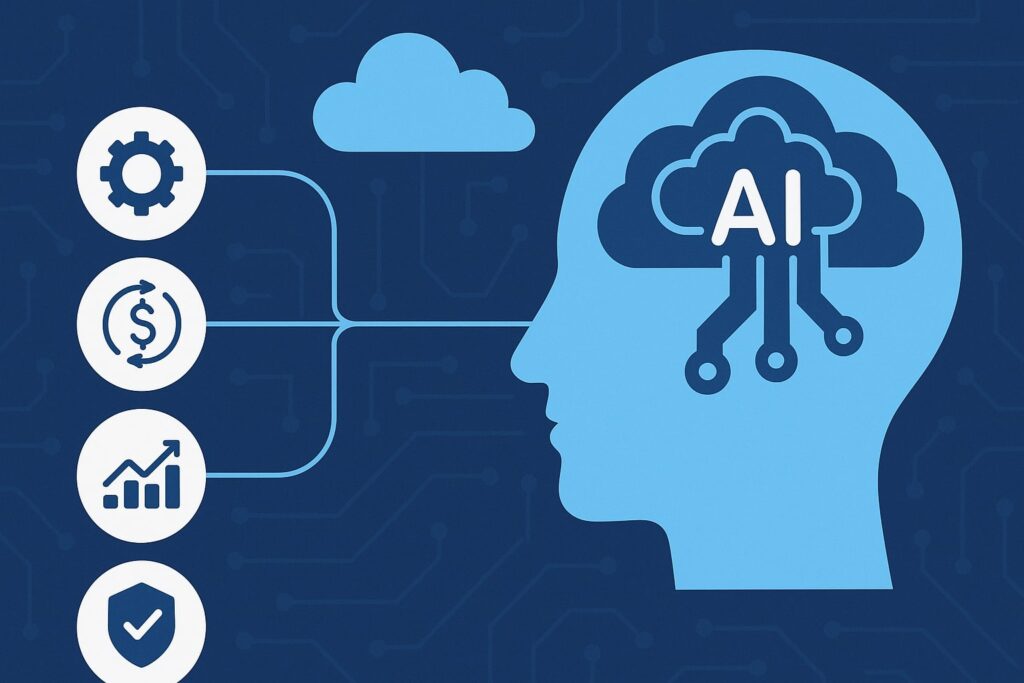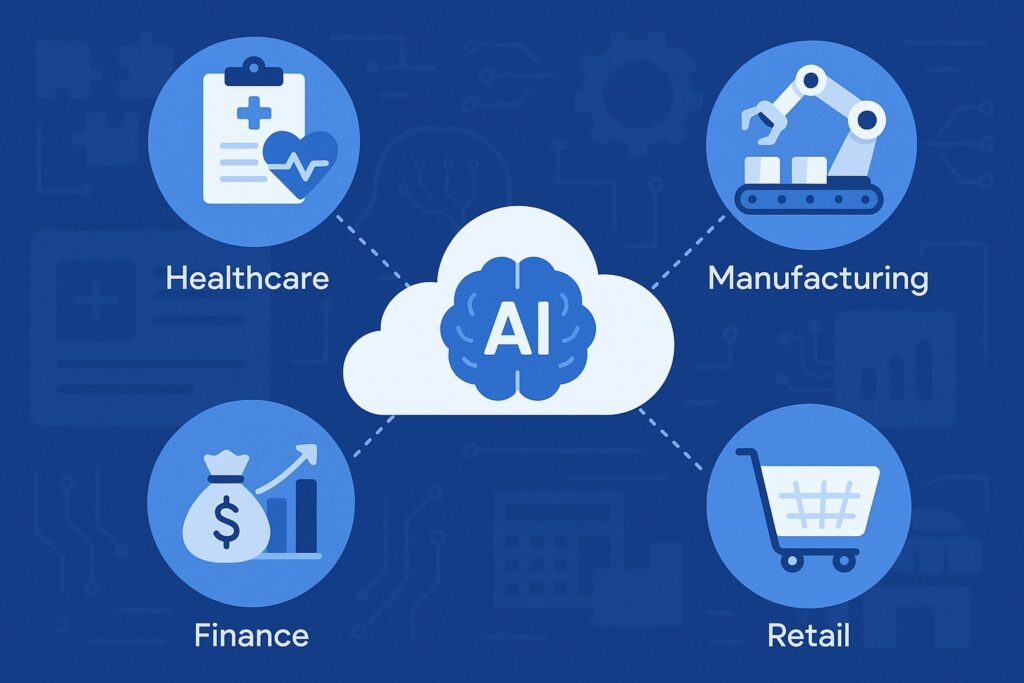
By hostmyai September 29, 2025
Artificial Intelligence (AI) has become one of the most transformative forces in today’s digital economy. From predictive analytics to natural language processing and machine learning models, businesses of every size are leveraging AI to gain a competitive edge.
However, deploying AI at scale requires massive computational resources, data storage, and reliable infrastructure. Traditional on-premise servers often fall short of delivering the speed, flexibility, and scalability that AI workloads demand. This is where cloud hosting for AI comes into play.
Cloud hosting for AI refers to the use of cloud infrastructure, platforms, and services to build, train, and deploy AI applications. Unlike traditional hosting, where resources are tied to physical servers, cloud hosting provides virtualized, scalable environments that can handle the heavy processing needs of AI.
Businesses can leverage powerful GPUs, TPUs, and high-performance computing clusters in the cloud without investing in expensive hardware.
In this comprehensive guide, we’ll explore what cloud hosting for AI is, why it is critical for modern businesses, and how it empowers organizations to innovate faster, reduce costs, and scale seamlessly.
We’ll also cover the different models of cloud AI hosting, use cases across industries, key benefits, potential challenges, and frequently asked questions to help you make informed decisions.
Understanding Cloud Hosting for AI

To fully appreciate why businesses need cloud hosting for AI, it’s essential to understand how it works and what makes it unique compared to standard hosting. Traditional web hosting focuses primarily on storing website files and delivering them to users’ browsers. AI hosting, however, involves far more complex requirements.
At its core, AI depends on three critical components: data, algorithms, and computing power. AI systems must process vast datasets, train models using complex algorithms, and perform inference in real-time.
These tasks require enormous computing resources, often involving high-end GPUs or specialized processors like TPUs (Tensor Processing Units). Purchasing, maintaining, and upgrading this hardware in-house can be prohibitively expensive for most businesses.
Cloud hosting solves this problem by offering on-demand access to computational resources via the internet. Instead of purchasing servers and processors, businesses “rent” computing power from cloud service providers such as Amazon Web Services (AWS), Google Cloud, Microsoft Azure, or specialized AI platforms.
These providers maintain massive data centers equipped with cutting-edge infrastructure, allowing businesses to scale resources up or down as needed.
Another distinguishing feature of cloud hosting for AI is its ability to support distributed computing. AI workloads, particularly training deep learning models, can take days or even weeks on a single machine.
Cloud hosting enables parallel processing across multiple nodes, drastically reducing training time and improving efficiency. Moreover, cloud AI services often include built-in tools for model development, data management, and deployment.
For example, platforms like Google AI Platform or AWS SageMaker provide pre-built frameworks, libraries, and APIs that make it easier for developers to experiment, build, and launch AI solutions without reinventing the wheel.
Ultimately, cloud hosting provides businesses with agility, scalability, and cost efficiency while removing the burden of infrastructure management. By outsourcing the heavy lifting to the cloud, organizations can focus more on innovation, product development, and customer experience.
Why Businesses Need Cloud Hosting for AI

The rise of AI across industries is not just a trend—it is a fundamental shift in how businesses operate, compete, and deliver value. Cloud hosting is the backbone that makes AI accessible and sustainable for organizations of all sizes. Let’s explore the key reasons why businesses need cloud hosting for AI.
1. Cost Efficiency and Resource Optimization
Building in-house AI infrastructure requires significant capital investment in high-performance servers, GPUs, storage systems, and cooling mechanisms. In addition, businesses must hire IT staff to maintain and upgrade this infrastructure. For small and mid-sized companies, this cost barrier can be insurmountable.
Cloud hosting eliminates these upfront expenses by offering a pay-as-you-go model. Companies pay only for the resources they use, allowing them to scale costs in proportion to their projects. This democratizes AI, making it accessible to startups and enterprises alike.
2. Scalability and Flexibility
AI projects often have unpredictable resource requirements. Training a model may demand massive GPU power one week, while inference tasks may require lighter resources the next. Cloud hosting allows businesses to scale resources up or down instantly, ensuring they always have the right level of performance without overpaying.
3. Faster Time-to-Market
In competitive industries, speed is crucial. Cloud AI platforms offer pre-configured environments, APIs, and pre-trained models that accelerate development. Instead of spending months setting up infrastructure, businesses can focus on building and deploying solutions that drive results quickly.
4. Access to Cutting-Edge Technology
Cloud providers constantly update their hardware and services. Businesses using cloud AI hosting automatically gain access to the latest GPUs, machine learning libraries, and security features without having to manage upgrades themselves.
5. Enhanced Collaboration and Remote Work
With cloud hosting, AI teams distributed across geographies can collaborate seamlessly on shared datasets, models, and workflows. Cloud platforms provide centralized access, version control, and monitoring, making remote AI development smooth and efficient.
In short, businesses need cloud hosting for AI because it transforms artificial intelligence from an expensive luxury into an accessible, scalable, and business-critical tool.
Key Benefits of Cloud Hosting for AI

Cloud hosting for AI doesn’t just solve infrastructure problems—it delivers a host of tangible benefits that directly impact business outcomes. Let’s dive deeper into the most important advantages.
Improved Performance and Speed
AI workloads are highly compute-intensive. Cloud hosting provides businesses with access to high-performance GPUs, TPUs, and scalable computing clusters designed to handle these demands. This ensures faster training, shorter development cycles, and more accurate models.
Cost-Effective Innovation
The pay-per-use model allows businesses to experiment with AI without committing large budgets upfront. Startups can test new ideas, while enterprises can explore innovative use cases without financial risk.
Global Accessibility
Cloud providers operate data centers across the globe. Businesses can deploy AI solutions close to their target markets, reducing latency and improving user experience. This is particularly critical for applications like autonomous vehicles, real-time translation, and financial trading.
Data Security and Compliance
Leading cloud providers invest heavily in security and compliance certifications. By leveraging their infrastructure, businesses can benefit from advanced encryption, threat detection, and compliance with industry regulations such as GDPR, HIPAA, and PCI-DSS.
Continuous Updates and Maintenance
Unlike on-premise infrastructure, which requires manual upgrades, cloud AI services automatically update to the latest technologies. Businesses always have access to the best tools without worrying about obsolescence.
The benefits make cloud hosting not just a technology choice but a strategic decision for businesses aiming to thrive in a data-driven world.
Use Cases of Cloud Hosting for AI Across Industries

AI’s versatility makes it relevant across virtually every industry. Cloud hosting enables organizations to apply AI solutions at scale, unlocking new opportunities.
Healthcare
In healthcare, AI models analyze medical images, predict patient outcomes, and assist in drug discovery. Cloud hosting ensures that large datasets and complex models can be processed efficiently, improving patient care and accelerating research.
Retail and E-commerce
Retailers use AI for demand forecasting, personalized recommendations, and fraud detection. Cloud AI platforms make it possible to analyze customer data in real time and optimize shopping experiences.
Finance
Banks and fintech companies rely on AI for credit scoring, risk assessment, and fraud prevention. Cloud hosting provides the speed and compliance frameworks needed for secure financial AI operations.
Manufacturing
In manufacturing, AI-powered predictive maintenance reduces downtime, while computer vision ensures quality control. Cloud infrastructure supports these large-scale industrial applications effectively.
Transportation
Self-driving cars and logistics companies rely on AI for navigation, route optimization, and fleet management. Cloud AI enables real-time data processing and decision-making on a global scale.
From startups to Fortune 500 companies, cloud hosting makes AI adoption feasible, scalable, and profitable.
Challenges and Considerations in Cloud Hosting for AI
While cloud hosting offers immense advantages, businesses must also consider potential challenges and address them proactively.
- Data Privacy and Compliance
Moving sensitive data to the cloud raises concerns about privacy and regulatory compliance. Businesses must carefully vet cloud providers and ensure compliance with local and international regulations. - Cost Management
Although cloud hosting is cost-efficient, poor planning can lead to unexpectedly high bills. Businesses must monitor usage, set budgets, and optimize workloads to keep costs under control. - Vendor Lock-In
Relying heavily on a single cloud provider can create dependency, making it difficult to switch in the future. To mitigate this, businesses should adopt multi-cloud or hybrid strategies. - Latency Issues
For real-time applications like autonomous vehicles or live trading, latency can be a challenge. Businesses need to strategically deploy AI workloads in cloud regions close to their users. - Skill Gaps
AI and cloud technologies require specialized skills. Businesses may need to invest in training or hire talent to maximize the benefits of cloud AI hosting.
By addressing these challenges thoughtfully, businesses can harness the full potential of cloud AI hosting.
FAQs
Q1. What is the difference between cloud hosting and traditional hosting for AI?
Answer: Traditional hosting focuses on storing files and running applications on physical servers, while cloud hosting provides virtualized, scalable resources tailored for compute-intensive workloads like AI.
Q2. Is cloud hosting for AI only for large enterprises?
Answer: No. Thanks to flexible pricing models, even small businesses and startups can leverage cloud AI services to innovate and grow.
Q3. Which cloud providers are best for AI hosting?
Answer: Popular options include AWS (SageMaker), Google Cloud AI, Microsoft Azure AI, and IBM Watson. Each has unique strengths depending on your industry and project requirements.
Q4. How secure is cloud hosting for AI?
Answer: Leading providers offer advanced encryption, access controls, and compliance certifications, making cloud hosting more secure than many on-premise solutions.
Q5. Can businesses use hybrid models for AI hosting?
Answer: Yes. Many organizations use a hybrid model, combining on-premise resources with cloud services for flexibility, security, and cost optimization.
Conclusion
Cloud hosting for AI is not just a technological trend—it is a business necessity. By providing scalable resources, cost efficiency, and access to advanced tools, cloud hosting empowers businesses to harness the full potential of artificial intelligence.
From healthcare to finance, retail to transportation, AI in the cloud is driving innovation, enhancing customer experiences, and shaping the future of industries worldwide.
While challenges like cost management and compliance exist, the benefits far outweigh the risks. Businesses that embrace cloud AI hosting today will be better positioned to compete, innovate, and grow in the rapidly evolving digital economy.
In summary, cloud hosting for AI transforms artificial intelligence from a resource-heavy luxury into an accessible, scalable, and indispensable tool for modern business success.